Discovering Science: The Role of Teachers in Primary Science Education
VerifiedAdded on 2023/06/09
|8
|2332
|289
Essay
AI Summary
This essay provides a comprehensive overview of science education within the context of primary schools, emphasizing the crucial role of teachers in fostering student learning and scientific literacy. It delves into the responsibilities of both generalist and specialist teachers, highlighting how they can cultivate students' curiosity and interest in science through effective teaching strategies and curriculum integration. The essay explores the importance of creating a positive learning environment, using real-world applications, and encouraging critical thinking. Furthermore, it discusses the impact of science education on students' lives, including their ability to make informed decisions related to health, nutrition, and the environment, as well as the development of essential skills for future career choices. The essay also references various studies and resources to support its arguments, providing a well-rounded perspective on the significance of science education in shaping young learners' understanding of the world around them. The assignment is available on Desklib, a platform for students with access to past papers and solved assignments.
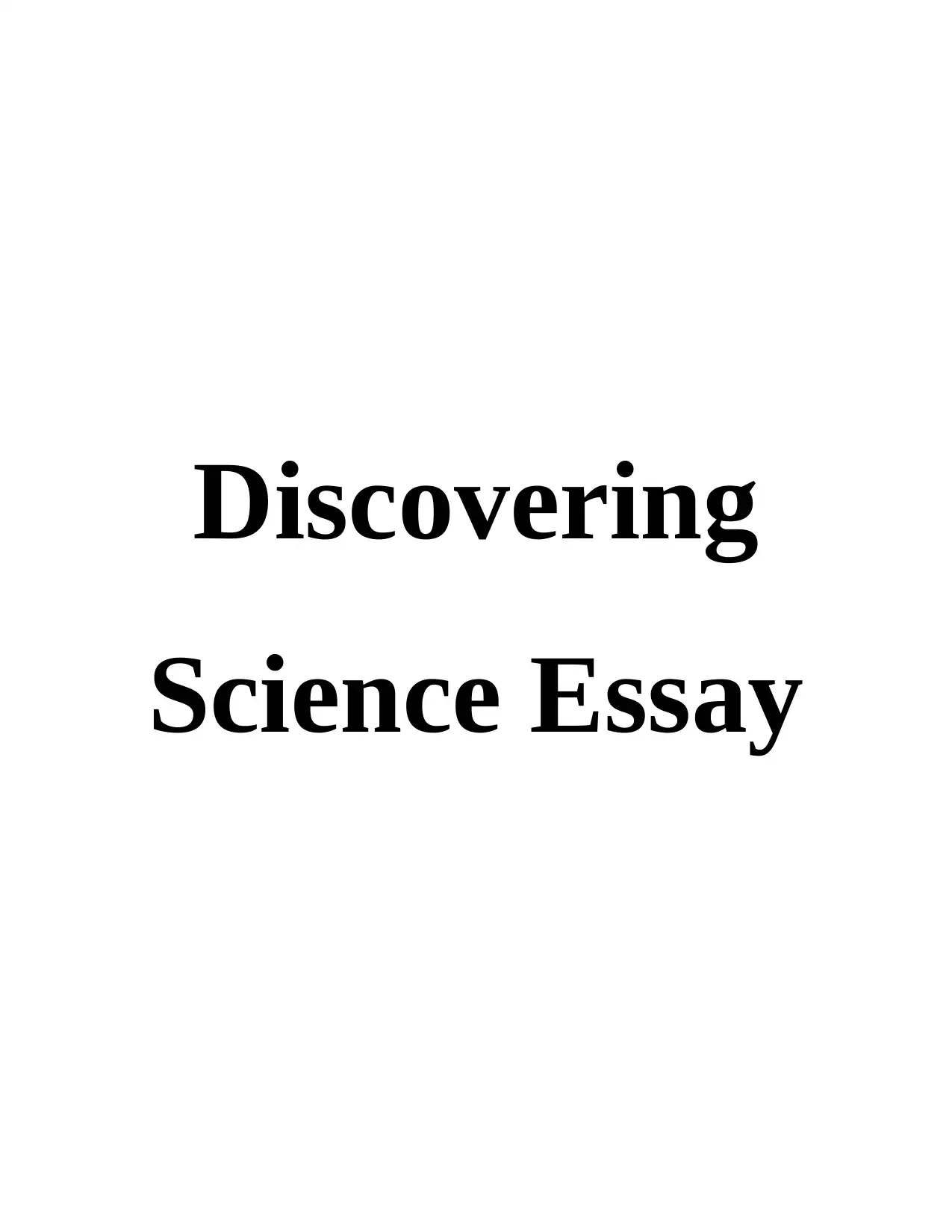
Discovering
Science Essay
Science Essay
Paraphrase This Document
Need a fresh take? Get an instant paraphrase of this document with our AI Paraphraser

Contents
INTRODUCTION...........................................................................................................................1
MAIN BODY .................................................................................................................................1
CONCLUSION ...............................................................................................................................5
REFERENCES................................................................................................................................6
INTRODUCTION...........................................................................................................................1
MAIN BODY .................................................................................................................................1
CONCLUSION ...............................................................................................................................5
REFERENCES................................................................................................................................6
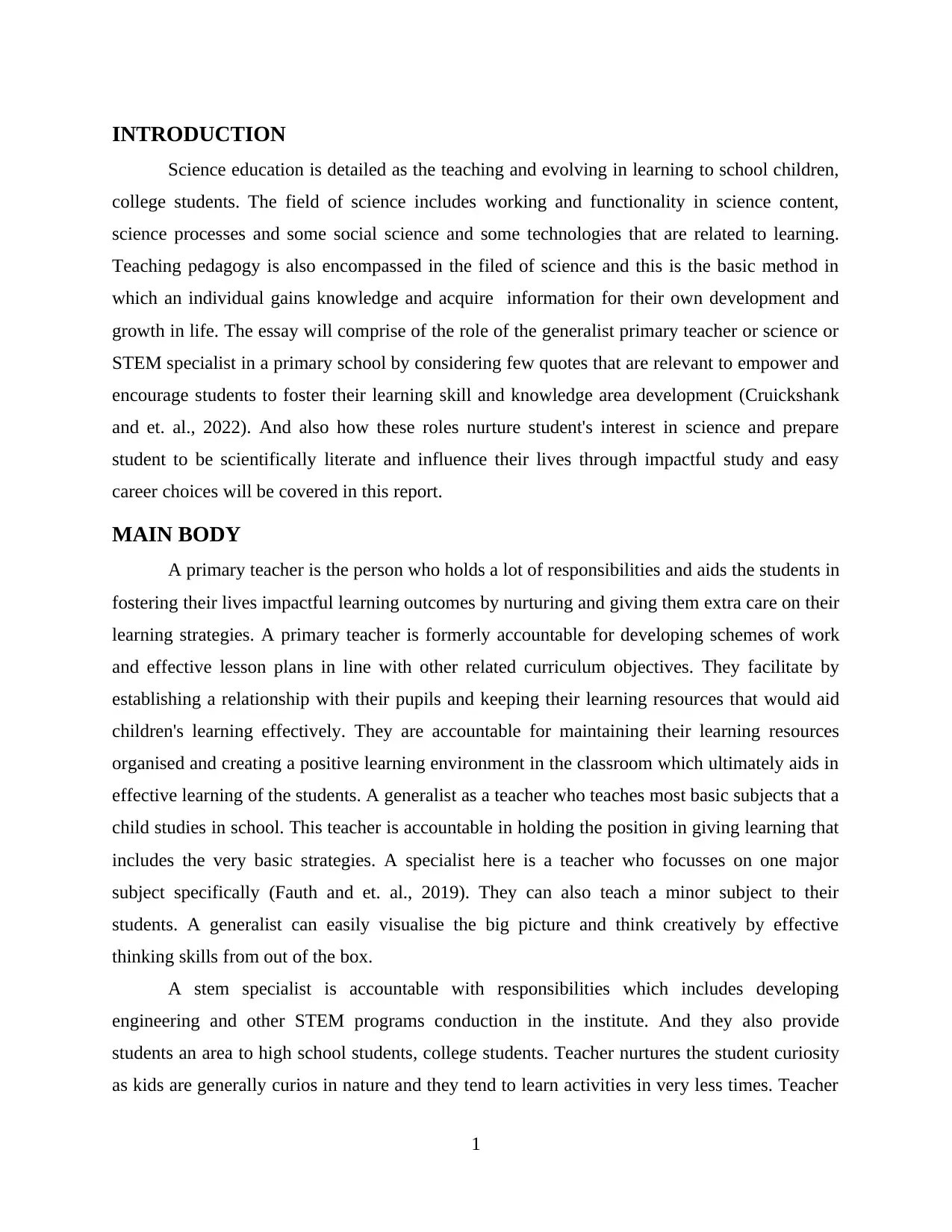
INTRODUCTION
Science education is detailed as the teaching and evolving in learning to school children,
college students. The field of science includes working and functionality in science content,
science processes and some social science and some technologies that are related to learning.
Teaching pedagogy is also encompassed in the filed of science and this is the basic method in
which an individual gains knowledge and acquire information for their own development and
growth in life. The essay will comprise of the role of the generalist primary teacher or science or
STEM specialist in a primary school by considering few quotes that are relevant to empower and
encourage students to foster their learning skill and knowledge area development (Cruickshank
and et. al., 2022). And also how these roles nurture student's interest in science and prepare
student to be scientifically literate and influence their lives through impactful study and easy
career choices will be covered in this report.
MAIN BODY
A primary teacher is the person who holds a lot of responsibilities and aids the students in
fostering their lives impactful learning outcomes by nurturing and giving them extra care on their
learning strategies. A primary teacher is formerly accountable for developing schemes of work
and effective lesson plans in line with other related curriculum objectives. They facilitate by
establishing a relationship with their pupils and keeping their learning resources that would aid
children's learning effectively. They are accountable for maintaining their learning resources
organised and creating a positive learning environment in the classroom which ultimately aids in
effective learning of the students. A generalist as a teacher who teaches most basic subjects that a
child studies in school. This teacher is accountable in holding the position in giving learning that
includes the very basic strategies. A specialist here is a teacher who focusses on one major
subject specifically (Fauth and et. al., 2019). They can also teach a minor subject to their
students. A generalist can easily visualise the big picture and think creatively by effective
thinking skills from out of the box.
A stem specialist is accountable with responsibilities which includes developing
engineering and other STEM programs conduction in the institute. And they also provide
students an area to high school students, college students. Teacher nurtures the student curiosity
as kids are generally curios in nature and they tend to learn activities in very less times. Teacher
1
Science education is detailed as the teaching and evolving in learning to school children,
college students. The field of science includes working and functionality in science content,
science processes and some social science and some technologies that are related to learning.
Teaching pedagogy is also encompassed in the filed of science and this is the basic method in
which an individual gains knowledge and acquire information for their own development and
growth in life. The essay will comprise of the role of the generalist primary teacher or science or
STEM specialist in a primary school by considering few quotes that are relevant to empower and
encourage students to foster their learning skill and knowledge area development (Cruickshank
and et. al., 2022). And also how these roles nurture student's interest in science and prepare
student to be scientifically literate and influence their lives through impactful study and easy
career choices will be covered in this report.
MAIN BODY
A primary teacher is the person who holds a lot of responsibilities and aids the students in
fostering their lives impactful learning outcomes by nurturing and giving them extra care on their
learning strategies. A primary teacher is formerly accountable for developing schemes of work
and effective lesson plans in line with other related curriculum objectives. They facilitate by
establishing a relationship with their pupils and keeping their learning resources that would aid
children's learning effectively. They are accountable for maintaining their learning resources
organised and creating a positive learning environment in the classroom which ultimately aids in
effective learning of the students. A generalist as a teacher who teaches most basic subjects that a
child studies in school. This teacher is accountable in holding the position in giving learning that
includes the very basic strategies. A specialist here is a teacher who focusses on one major
subject specifically (Fauth and et. al., 2019). They can also teach a minor subject to their
students. A generalist can easily visualise the big picture and think creatively by effective
thinking skills from out of the box.
A stem specialist is accountable with responsibilities which includes developing
engineering and other STEM programs conduction in the institute. And they also provide
students an area to high school students, college students. Teacher nurtures the student curiosity
as kids are generally curios in nature and they tend to learn activities in very less times. Teacher
1
⊘ This is a preview!⊘
Do you want full access?
Subscribe today to unlock all pages.

Trusted by 1+ million students worldwide
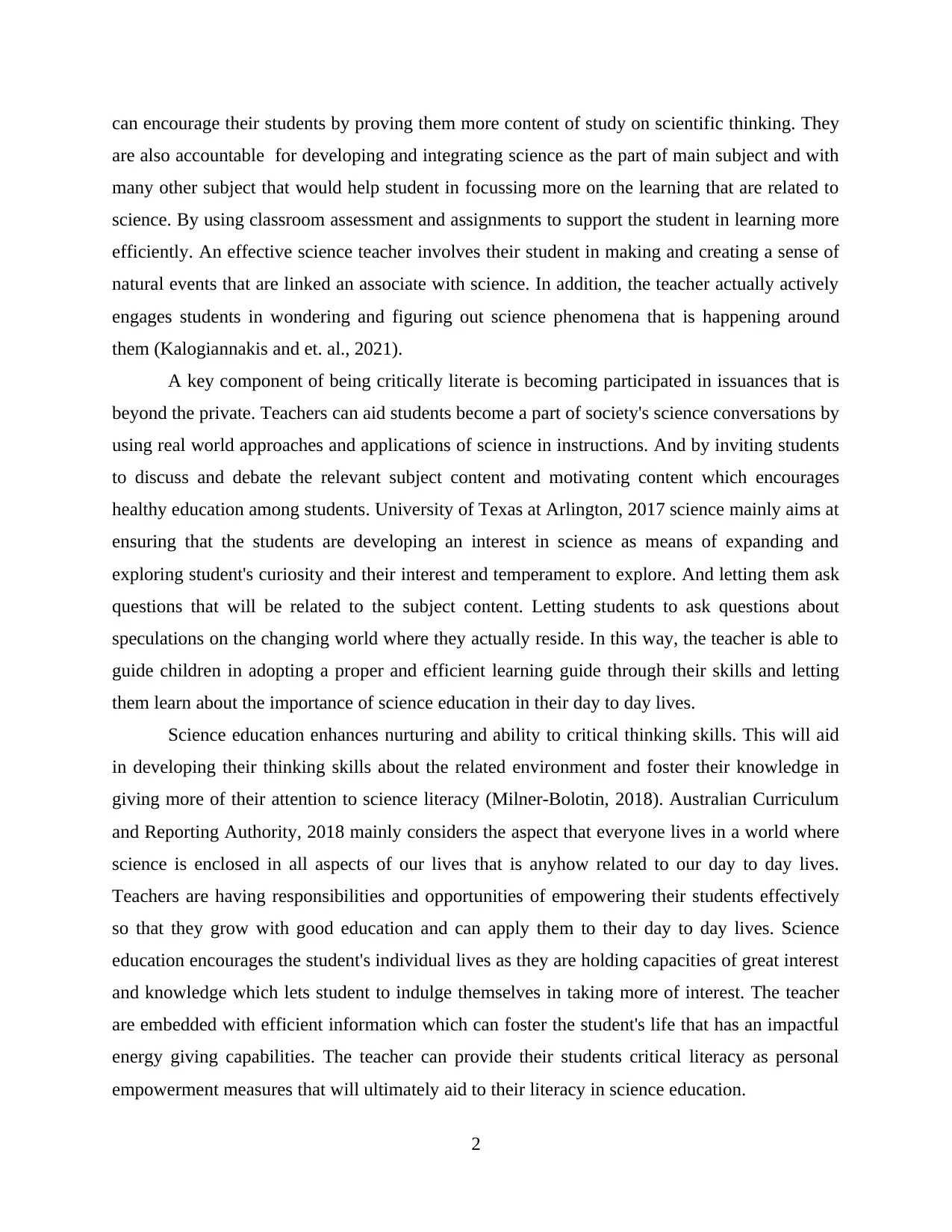
can encourage their students by proving them more content of study on scientific thinking. They
are also accountable for developing and integrating science as the part of main subject and with
many other subject that would help student in focussing more on the learning that are related to
science. By using classroom assessment and assignments to support the student in learning more
efficiently. An effective science teacher involves their student in making and creating a sense of
natural events that are linked an associate with science. In addition, the teacher actually actively
engages students in wondering and figuring out science phenomena that is happening around
them (Kalogiannakis and et. al., 2021).
A key component of being critically literate is becoming participated in issuances that is
beyond the private. Teachers can aid students become a part of society's science conversations by
using real world approaches and applications of science in instructions. And by inviting students
to discuss and debate the relevant subject content and motivating content which encourages
healthy education among students. University of Texas at Arlington, 2017 science mainly aims at
ensuring that the students are developing an interest in science as means of expanding and
exploring student's curiosity and their interest and temperament to explore. And letting them ask
questions that will be related to the subject content. Letting students to ask questions about
speculations on the changing world where they actually reside. In this way, the teacher is able to
guide children in adopting a proper and efficient learning guide through their skills and letting
them learn about the importance of science education in their day to day lives.
Science education enhances nurturing and ability to critical thinking skills. This will aid
in developing their thinking skills about the related environment and foster their knowledge in
giving more of their attention to science literacy (Milner-Bolotin, 2018). Australian Curriculum
and Reporting Authority, 2018 mainly considers the aspect that everyone lives in a world where
science is enclosed in all aspects of our lives that is anyhow related to our day to day lives.
Teachers are having responsibilities and opportunities of empowering their students effectively
so that they grow with good education and can apply them to their day to day lives. Science
education encourages the student's individual lives as they are holding capacities of great interest
and knowledge which lets student to indulge themselves in taking more of interest. The teacher
are embedded with efficient information which can foster the student's life that has an impactful
energy giving capabilities. The teacher can provide their students critical literacy as personal
empowerment measures that will ultimately aid to their literacy in science education.
2
are also accountable for developing and integrating science as the part of main subject and with
many other subject that would help student in focussing more on the learning that are related to
science. By using classroom assessment and assignments to support the student in learning more
efficiently. An effective science teacher involves their student in making and creating a sense of
natural events that are linked an associate with science. In addition, the teacher actually actively
engages students in wondering and figuring out science phenomena that is happening around
them (Kalogiannakis and et. al., 2021).
A key component of being critically literate is becoming participated in issuances that is
beyond the private. Teachers can aid students become a part of society's science conversations by
using real world approaches and applications of science in instructions. And by inviting students
to discuss and debate the relevant subject content and motivating content which encourages
healthy education among students. University of Texas at Arlington, 2017 science mainly aims at
ensuring that the students are developing an interest in science as means of expanding and
exploring student's curiosity and their interest and temperament to explore. And letting them ask
questions that will be related to the subject content. Letting students to ask questions about
speculations on the changing world where they actually reside. In this way, the teacher is able to
guide children in adopting a proper and efficient learning guide through their skills and letting
them learn about the importance of science education in their day to day lives.
Science education enhances nurturing and ability to critical thinking skills. This will aid
in developing their thinking skills about the related environment and foster their knowledge in
giving more of their attention to science literacy (Milner-Bolotin, 2018). Australian Curriculum
and Reporting Authority, 2018 mainly considers the aspect that everyone lives in a world where
science is enclosed in all aspects of our lives that is anyhow related to our day to day lives.
Teachers are having responsibilities and opportunities of empowering their students effectively
so that they grow with good education and can apply them to their day to day lives. Science
education encourages the student's individual lives as they are holding capacities of great interest
and knowledge which lets student to indulge themselves in taking more of interest. The teacher
are embedded with efficient information which can foster the student's life that has an impactful
energy giving capabilities. The teacher can provide their students critical literacy as personal
empowerment measures that will ultimately aid to their literacy in science education.
2
Paraphrase This Document
Need a fresh take? Get an instant paraphrase of this document with our AI Paraphraser
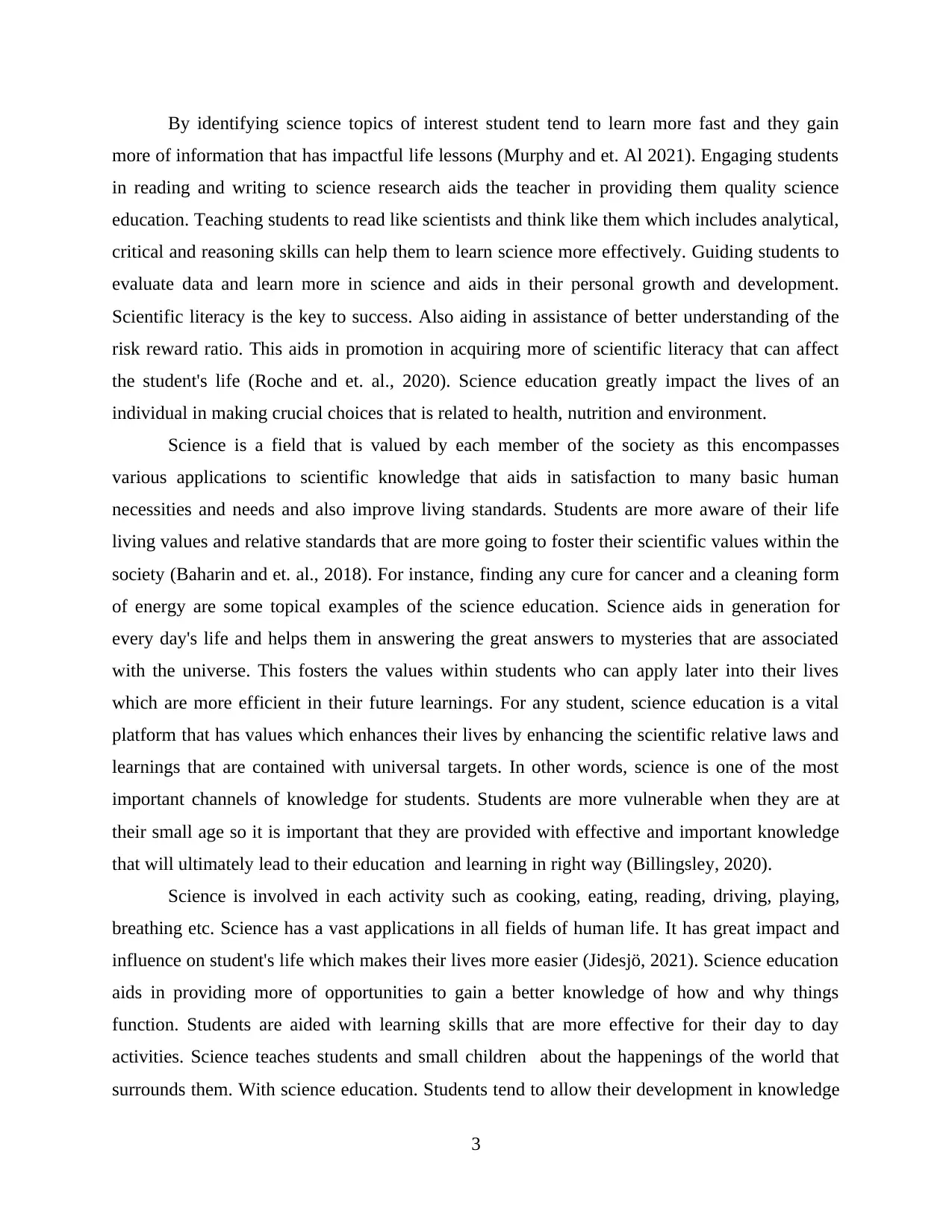
By identifying science topics of interest student tend to learn more fast and they gain
more of information that has impactful life lessons (Murphy and et. Al 2021). Engaging students
in reading and writing to science research aids the teacher in providing them quality science
education. Teaching students to read like scientists and think like them which includes analytical,
critical and reasoning skills can help them to learn science more effectively. Guiding students to
evaluate data and learn more in science and aids in their personal growth and development.
Scientific literacy is the key to success. Also aiding in assistance of better understanding of the
risk reward ratio. This aids in promotion in acquiring more of scientific literacy that can affect
the student's life (Roche and et. al., 2020). Science education greatly impact the lives of an
individual in making crucial choices that is related to health, nutrition and environment.
Science is a field that is valued by each member of the society as this encompasses
various applications to scientific knowledge that aids in satisfaction to many basic human
necessities and needs and also improve living standards. Students are more aware of their life
living values and relative standards that are more going to foster their scientific values within the
society (Baharin and et. al., 2018). For instance, finding any cure for cancer and a cleaning form
of energy are some topical examples of the science education. Science aids in generation for
every day's life and helps them in answering the great answers to mysteries that are associated
with the universe. This fosters the values within students who can apply later into their lives
which are more efficient in their future learnings. For any student, science education is a vital
platform that has values which enhances their lives by enhancing the scientific relative laws and
learnings that are contained with universal targets. In other words, science is one of the most
important channels of knowledge for students. Students are more vulnerable when they are at
their small age so it is important that they are provided with effective and important knowledge
that will ultimately lead to their education and learning in right way (Billingsley, 2020).
Science is involved in each activity such as cooking, eating, reading, driving, playing,
breathing etc. Science has a vast applications in all fields of human life. It has great impact and
influence on student's life which makes their lives more easier (Jidesjö, 2021). Science education
aids in providing more of opportunities to gain a better knowledge of how and why things
function. Students are aided with learning skills that are more effective for their day to day
activities. Science teaches students and small children about the happenings of the world that
surrounds them. With science education. Students tend to allow their development in knowledge
3
more of information that has impactful life lessons (Murphy and et. Al 2021). Engaging students
in reading and writing to science research aids the teacher in providing them quality science
education. Teaching students to read like scientists and think like them which includes analytical,
critical and reasoning skills can help them to learn science more effectively. Guiding students to
evaluate data and learn more in science and aids in their personal growth and development.
Scientific literacy is the key to success. Also aiding in assistance of better understanding of the
risk reward ratio. This aids in promotion in acquiring more of scientific literacy that can affect
the student's life (Roche and et. al., 2020). Science education greatly impact the lives of an
individual in making crucial choices that is related to health, nutrition and environment.
Science is a field that is valued by each member of the society as this encompasses
various applications to scientific knowledge that aids in satisfaction to many basic human
necessities and needs and also improve living standards. Students are more aware of their life
living values and relative standards that are more going to foster their scientific values within the
society (Baharin and et. al., 2018). For instance, finding any cure for cancer and a cleaning form
of energy are some topical examples of the science education. Science aids in generation for
every day's life and helps them in answering the great answers to mysteries that are associated
with the universe. This fosters the values within students who can apply later into their lives
which are more efficient in their future learnings. For any student, science education is a vital
platform that has values which enhances their lives by enhancing the scientific relative laws and
learnings that are contained with universal targets. In other words, science is one of the most
important channels of knowledge for students. Students are more vulnerable when they are at
their small age so it is important that they are provided with effective and important knowledge
that will ultimately lead to their education and learning in right way (Billingsley, 2020).
Science is involved in each activity such as cooking, eating, reading, driving, playing,
breathing etc. Science has a vast applications in all fields of human life. It has great impact and
influence on student's life which makes their lives more easier (Jidesjö, 2021). Science education
aids in providing more of opportunities to gain a better knowledge of how and why things
function. Students are aided with learning skills that are more effective for their day to day
activities. Science teaches students and small children about the happenings of the world that
surrounds them. With science education. Students tend to allow their development in knowledge
3
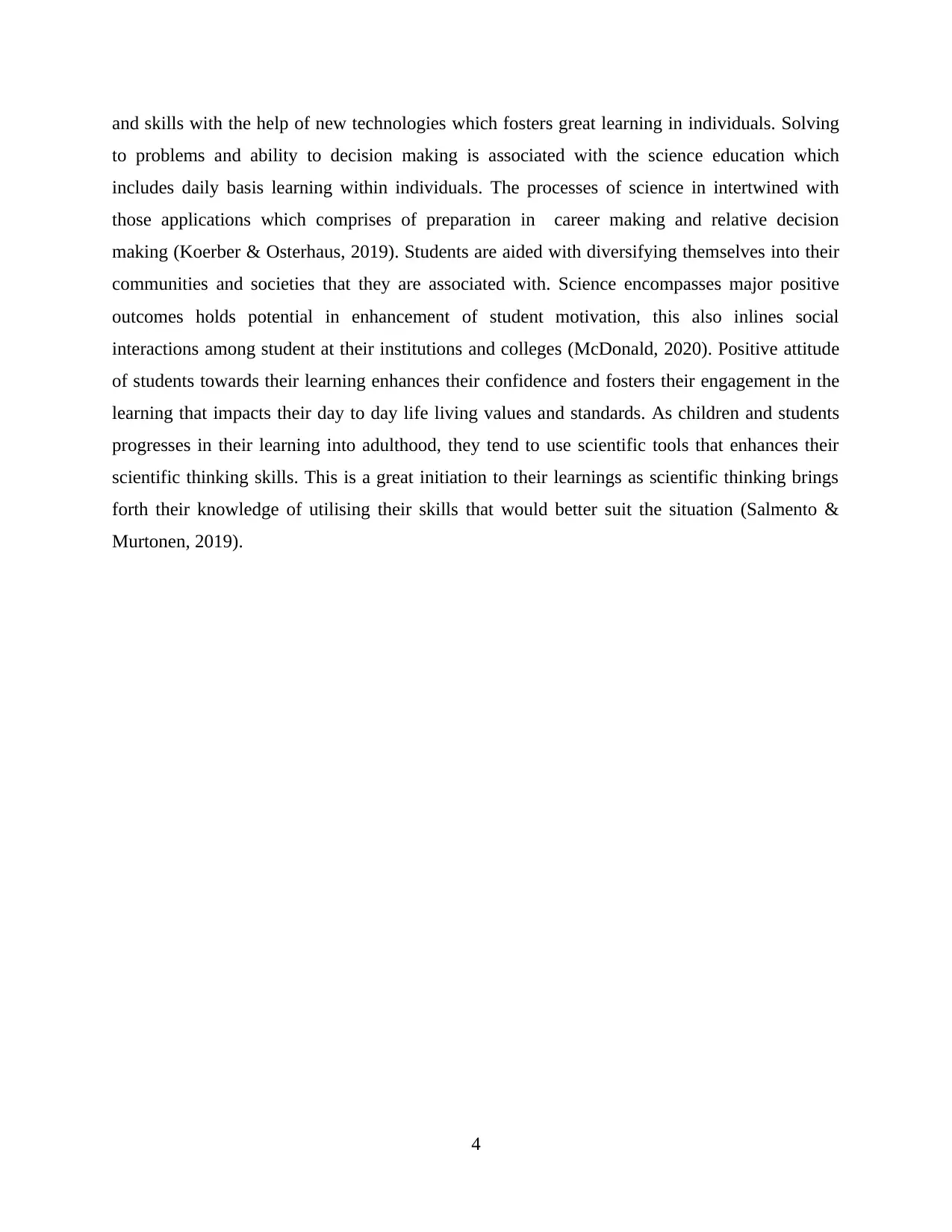
and skills with the help of new technologies which fosters great learning in individuals. Solving
to problems and ability to decision making is associated with the science education which
includes daily basis learning within individuals. The processes of science in intertwined with
those applications which comprises of preparation in career making and relative decision
making (Koerber & Osterhaus, 2019). Students are aided with diversifying themselves into their
communities and societies that they are associated with. Science encompasses major positive
outcomes holds potential in enhancement of student motivation, this also inlines social
interactions among student at their institutions and colleges (McDonald, 2020). Positive attitude
of students towards their learning enhances their confidence and fosters their engagement in the
learning that impacts their day to day life living values and standards. As children and students
progresses in their learning into adulthood, they tend to use scientific tools that enhances their
scientific thinking skills. This is a great initiation to their learnings as scientific thinking brings
forth their knowledge of utilising their skills that would better suit the situation (Salmento &
Murtonen, 2019).
4
to problems and ability to decision making is associated with the science education which
includes daily basis learning within individuals. The processes of science in intertwined with
those applications which comprises of preparation in career making and relative decision
making (Koerber & Osterhaus, 2019). Students are aided with diversifying themselves into their
communities and societies that they are associated with. Science encompasses major positive
outcomes holds potential in enhancement of student motivation, this also inlines social
interactions among student at their institutions and colleges (McDonald, 2020). Positive attitude
of students towards their learning enhances their confidence and fosters their engagement in the
learning that impacts their day to day life living values and standards. As children and students
progresses in their learning into adulthood, they tend to use scientific tools that enhances their
scientific thinking skills. This is a great initiation to their learnings as scientific thinking brings
forth their knowledge of utilising their skills that would better suit the situation (Salmento &
Murtonen, 2019).
4
⊘ This is a preview!⊘
Do you want full access?
Subscribe today to unlock all pages.

Trusted by 1+ million students worldwide
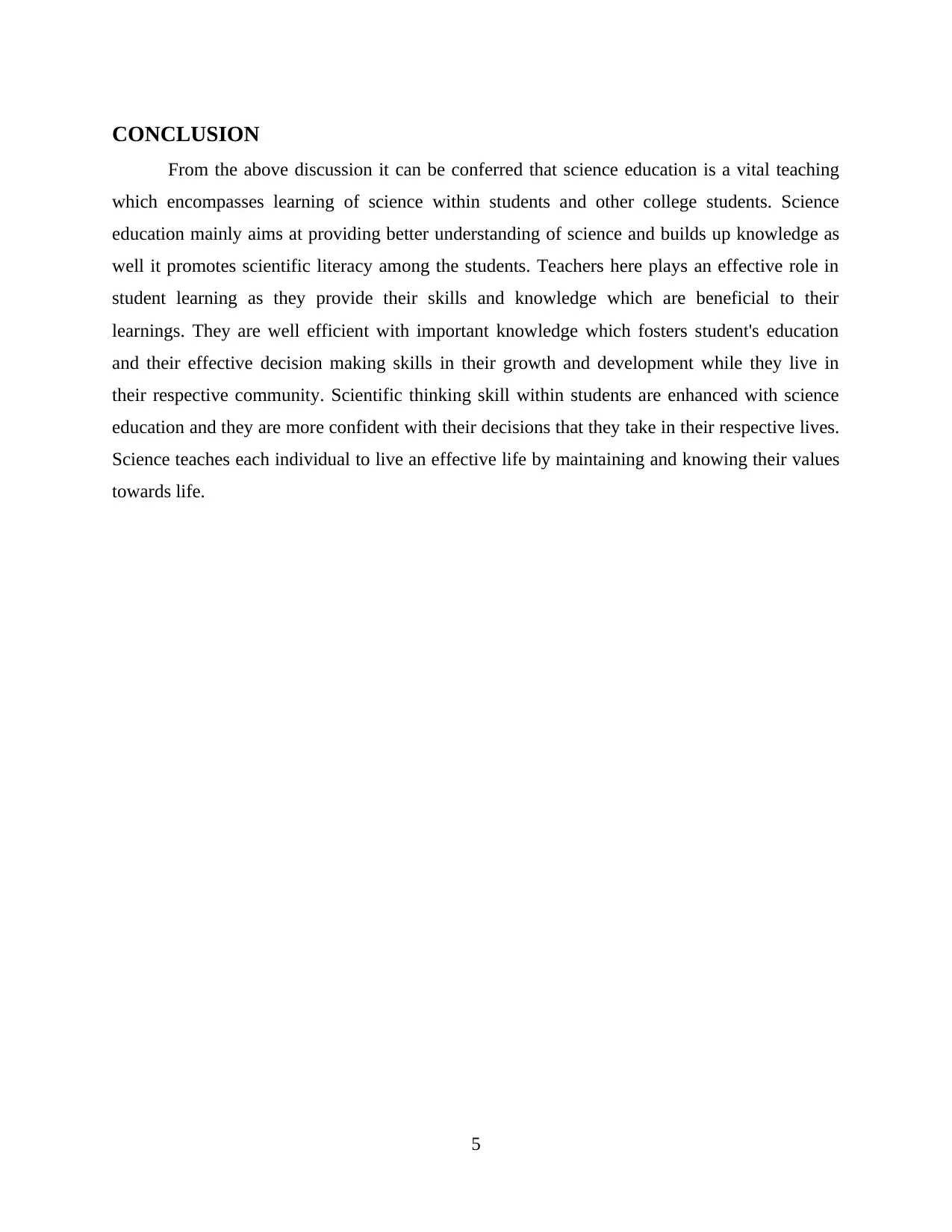
CONCLUSION
From the above discussion it can be conferred that science education is a vital teaching
which encompasses learning of science within students and other college students. Science
education mainly aims at providing better understanding of science and builds up knowledge as
well it promotes scientific literacy among the students. Teachers here plays an effective role in
student learning as they provide their skills and knowledge which are beneficial to their
learnings. They are well efficient with important knowledge which fosters student's education
and their effective decision making skills in their growth and development while they live in
their respective community. Scientific thinking skill within students are enhanced with science
education and they are more confident with their decisions that they take in their respective lives.
Science teaches each individual to live an effective life by maintaining and knowing their values
towards life.
5
From the above discussion it can be conferred that science education is a vital teaching
which encompasses learning of science within students and other college students. Science
education mainly aims at providing better understanding of science and builds up knowledge as
well it promotes scientific literacy among the students. Teachers here plays an effective role in
student learning as they provide their skills and knowledge which are beneficial to their
learnings. They are well efficient with important knowledge which fosters student's education
and their effective decision making skills in their growth and development while they live in
their respective community. Scientific thinking skill within students are enhanced with science
education and they are more confident with their decisions that they take in their respective lives.
Science teaches each individual to live an effective life by maintaining and knowing their values
towards life.
5
Paraphrase This Document
Need a fresh take? Get an instant paraphrase of this document with our AI Paraphraser
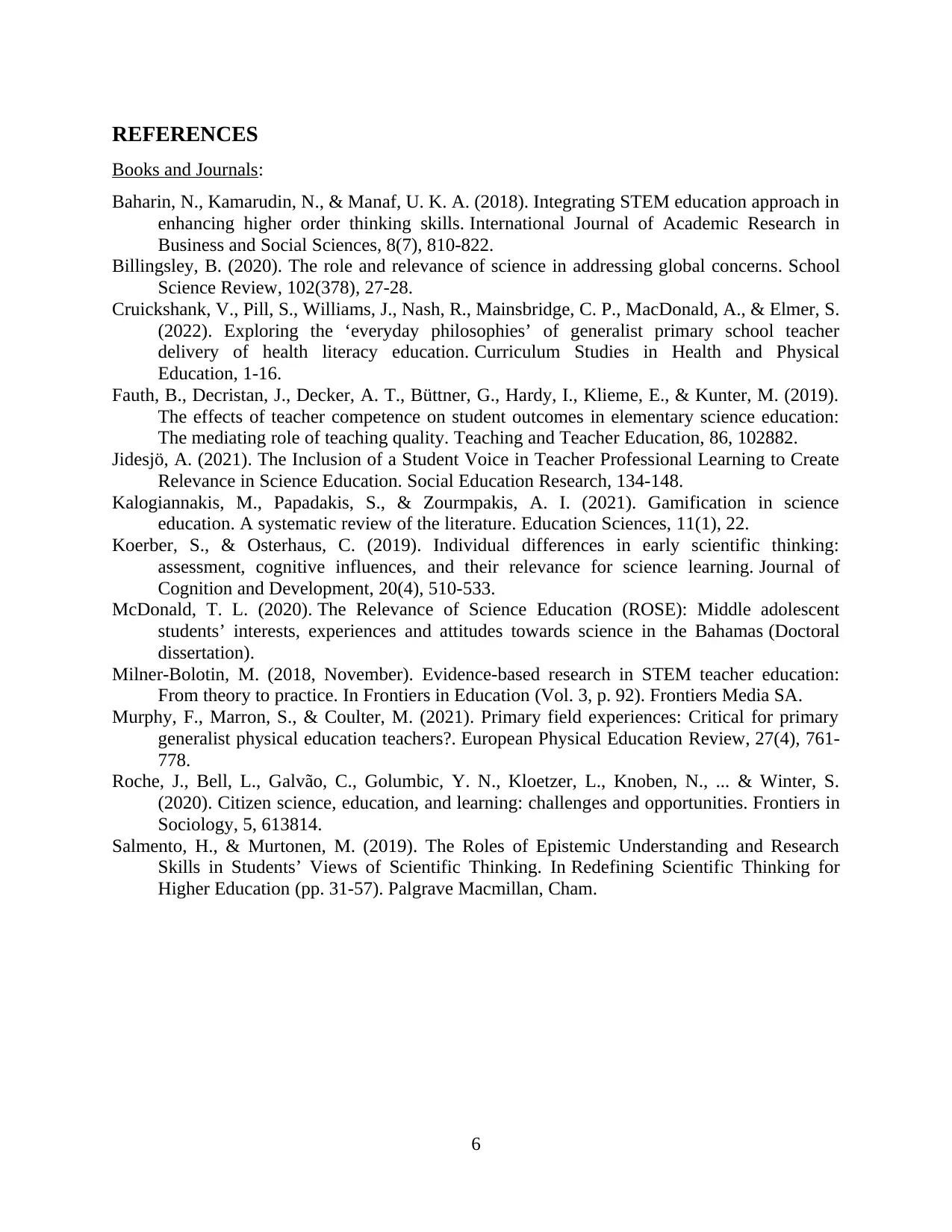
REFERENCES
Books and Journals:
Baharin, N., Kamarudin, N., & Manaf, U. K. A. (2018). Integrating STEM education approach in
enhancing higher order thinking skills. International Journal of Academic Research in
Business and Social Sciences, 8(7), 810-822.
Billingsley, B. (2020). The role and relevance of science in addressing global concerns. School
Science Review, 102(378), 27-28.
Cruickshank, V., Pill, S., Williams, J., Nash, R., Mainsbridge, C. P., MacDonald, A., & Elmer, S.
(2022). Exploring the ‘everyday philosophies’ of generalist primary school teacher
delivery of health literacy education. Curriculum Studies in Health and Physical
Education, 1-16.
Fauth, B., Decristan, J., Decker, A. T., Büttner, G., Hardy, I., Klieme, E., & Kunter, M. (2019).
The effects of teacher competence on student outcomes in elementary science education:
The mediating role of teaching quality. Teaching and Teacher Education, 86, 102882.
Jidesjö, A. (2021). The Inclusion of a Student Voice in Teacher Professional Learning to Create
Relevance in Science Education. Social Education Research, 134-148.
Kalogiannakis, M., Papadakis, S., & Zourmpakis, A. I. (2021). Gamification in science
education. A systematic review of the literature. Education Sciences, 11(1), 22.
Koerber, S., & Osterhaus, C. (2019). Individual differences in early scientific thinking:
assessment, cognitive influences, and their relevance for science learning. Journal of
Cognition and Development, 20(4), 510-533.
McDonald, T. L. (2020). The Relevance of Science Education (ROSE): Middle adolescent
students’ interests, experiences and attitudes towards science in the Bahamas (Doctoral
dissertation).
Milner-Bolotin, M. (2018, November). Evidence-based research in STEM teacher education:
From theory to practice. In Frontiers in Education (Vol. 3, p. 92). Frontiers Media SA.
Murphy, F., Marron, S., & Coulter, M. (2021). Primary field experiences: Critical for primary
generalist physical education teachers?. European Physical Education Review, 27(4), 761-
778.
Roche, J., Bell, L., Galvão, C., Golumbic, Y. N., Kloetzer, L., Knoben, N., ... & Winter, S.
(2020). Citizen science, education, and learning: challenges and opportunities. Frontiers in
Sociology, 5, 613814.
Salmento, H., & Murtonen, M. (2019). The Roles of Epistemic Understanding and Research
Skills in Students’ Views of Scientific Thinking. In Redefining Scientific Thinking for
Higher Education (pp. 31-57). Palgrave Macmillan, Cham.
6
Books and Journals:
Baharin, N., Kamarudin, N., & Manaf, U. K. A. (2018). Integrating STEM education approach in
enhancing higher order thinking skills. International Journal of Academic Research in
Business and Social Sciences, 8(7), 810-822.
Billingsley, B. (2020). The role and relevance of science in addressing global concerns. School
Science Review, 102(378), 27-28.
Cruickshank, V., Pill, S., Williams, J., Nash, R., Mainsbridge, C. P., MacDonald, A., & Elmer, S.
(2022). Exploring the ‘everyday philosophies’ of generalist primary school teacher
delivery of health literacy education. Curriculum Studies in Health and Physical
Education, 1-16.
Fauth, B., Decristan, J., Decker, A. T., Büttner, G., Hardy, I., Klieme, E., & Kunter, M. (2019).
The effects of teacher competence on student outcomes in elementary science education:
The mediating role of teaching quality. Teaching and Teacher Education, 86, 102882.
Jidesjö, A. (2021). The Inclusion of a Student Voice in Teacher Professional Learning to Create
Relevance in Science Education. Social Education Research, 134-148.
Kalogiannakis, M., Papadakis, S., & Zourmpakis, A. I. (2021). Gamification in science
education. A systematic review of the literature. Education Sciences, 11(1), 22.
Koerber, S., & Osterhaus, C. (2019). Individual differences in early scientific thinking:
assessment, cognitive influences, and their relevance for science learning. Journal of
Cognition and Development, 20(4), 510-533.
McDonald, T. L. (2020). The Relevance of Science Education (ROSE): Middle adolescent
students’ interests, experiences and attitudes towards science in the Bahamas (Doctoral
dissertation).
Milner-Bolotin, M. (2018, November). Evidence-based research in STEM teacher education:
From theory to practice. In Frontiers in Education (Vol. 3, p. 92). Frontiers Media SA.
Murphy, F., Marron, S., & Coulter, M. (2021). Primary field experiences: Critical for primary
generalist physical education teachers?. European Physical Education Review, 27(4), 761-
778.
Roche, J., Bell, L., Galvão, C., Golumbic, Y. N., Kloetzer, L., Knoben, N., ... & Winter, S.
(2020). Citizen science, education, and learning: challenges and opportunities. Frontiers in
Sociology, 5, 613814.
Salmento, H., & Murtonen, M. (2019). The Roles of Epistemic Understanding and Research
Skills in Students’ Views of Scientific Thinking. In Redefining Scientific Thinking for
Higher Education (pp. 31-57). Palgrave Macmillan, Cham.
6
1 out of 8
Related Documents
Your All-in-One AI-Powered Toolkit for Academic Success.
+13062052269
info@desklib.com
Available 24*7 on WhatsApp / Email
![[object Object]](/_next/static/media/star-bottom.7253800d.svg)
Unlock your academic potential
Copyright © 2020–2026 A2Z Services. All Rights Reserved. Developed and managed by ZUCOL.





